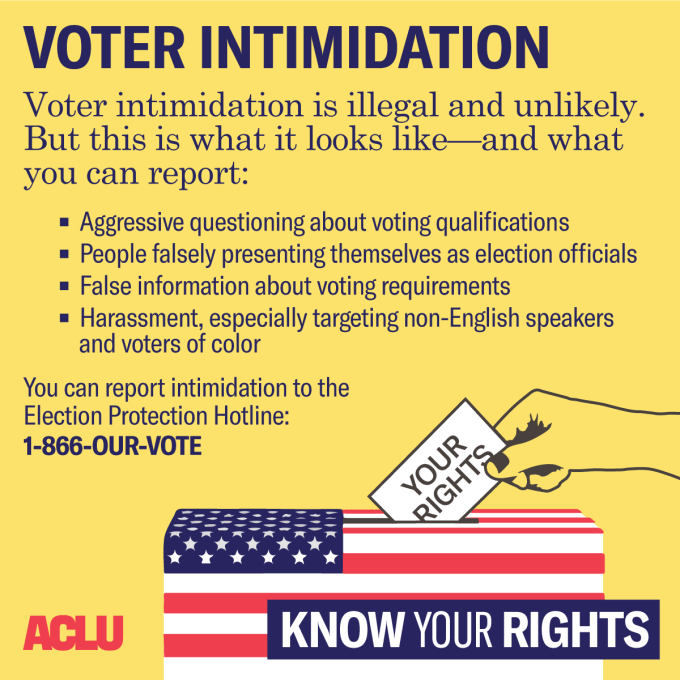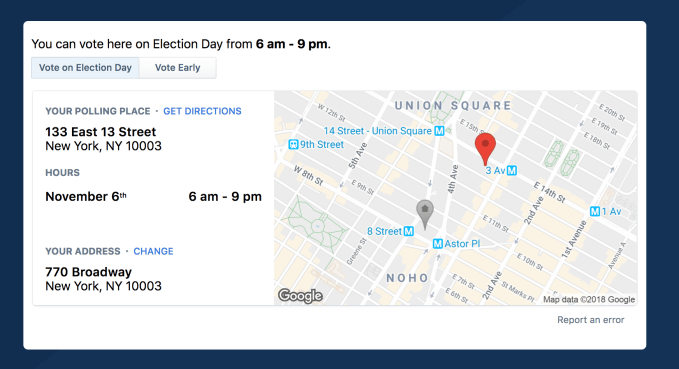Voting in the U.S. can be confusing. By design, every state is different. On top of that, disinformation meant to discourage voting is rampant this election. Cut through the noise, arm yourself with the facts and vote. We’ve got resources to help you.
1. Fill out a sample ballot for your state
If you’re not voting absentee or by mail, it’s helpful to have an idea of everything that’s on the ballot before you head into vote in person. Before you head to the polls, you can fill out a sample ballot through When We All Vote or an even more comprehensive one on Ballotpedia representing your state and local races online. Best yet, you can print, email or screenshot that and take it in with you to have a reference for your IRL voting experience so that you don’t get overwhelmed.
2. Know your rights
With rampant disinformation actively discouraging some people from going to the polls, it’s vital that you know your rights on Tuesday. Nonpartisan nonprofit Vote.org offers a guide to common problems encountered at polling places. Run into trouble? Call the Election Protection Hotline at 866-687-8683 for help. Whatever you do, don’t get discouraged — there are volunteers and organizations that can help sort things out.

Look over Vote.org’s list of common election day problems so you know what to do in case something goes awry.
If you aren’t yet registered to vote but decide that you’d like to (do it!), 18 states and the District of Columbia offer same-day registration that allows you to register and vote at the same time. Be prepared to provide an official ID and prove your residency with a utility bill, though be sure to look up the specific requirements of your state before you show up.
3. Find Your Polling Place
Figuring out where to vote and getting there is half the battle. Vote.org provides a useful polling place locator so you can look up the nearest place to cast your vote. This is important. “Polling locations are assigned by residential address,” USA.gov explains. “You should go to your assigned location since your name will not be on the roster at any other location. Your polling place may change from one election to the next, so check before you go to vote.”
If you try to vote at a polling place that isn’t the one you are assigned, you might have to fill out a provisional ballot. Provisional ballots are for “a voter whose eligibility to vote cannot be proven at the polls on Election Day” and Ballotpedia has a full guide to state by state practices for counting votes by provisional ballot. Be sure to check your state’s guidelines and proceed with caution — some states will not count a provisional ballot cast in the wrong precinct. The ACLU also provides a polling place guide as well as other state-specific resources worth a look.

4. Get to the polls
If you know where you need to be but are worried about getting there, a few tech transportation companies are running Election Day promos. The bike-sharing company Motivate will offer free rides for anyone in the Bay Area, Boston, Chicago, Columbus, Jersey City, New York City, Portland, Minneapolis and Washington, D.C.
If you need a ride to the polls, Uber users in the U.S. can cash in on a $10 ride credit using the code “VOTE2018.” For Election Day, Lyft partnered with BuzzFeed to provide 50 percent off of rides using a special ZIP code-specific promo code and will also provide free rides to people in some underserved communities in partnership with some nonprofit partners, including Voto Latino, Urban League affiliates, the National Federation of the Blind, Faith in Action, League of Women Voters, and the Student Vets of America. To check on those rides, check out or get in touch with the relevant organization.
Quick links:
Tl; dr? Here’s what you need:
- Fill out and email or print a sample ballot
- Find your poll location
- Know your rights before you vote
And again, if you have any issues at the polls you can call Contact the Election Protection Hotline at 866-OUR-VOTE and the Department of Justice Voting Rights Hotline (800-253-3931).

Source : 2018 Midterms: 4 resources every voter should know about










